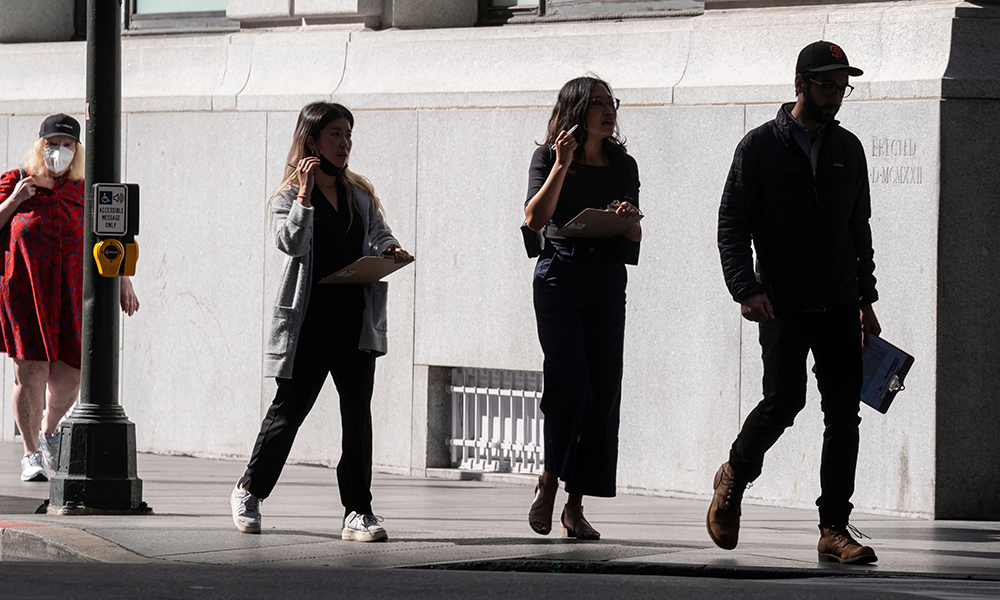
最近的調(diào)查發(fā)現(xiàn),一些在大辭職浪潮期間辭職的上班族終于感到后悔,因此人們討論的話題迅速從公司如何留住員工,變成將員工大量辭職歸咎為沖動(dòng)之舉。
然而,一些最重要的發(fā)現(xiàn)卻被忽視。在一項(xiàng)調(diào)查中,超過三分之一受訪者表現(xiàn)出“買家后悔”的情緒,但他們同時(shí)感覺工作生活平衡下降(36%),約三分之一(30%)受訪者表示,他們的新工作與自己的預(yù)期存在差異,四分之一(24%)受訪者表示懷念上一份工作的職場文化。
我們關(guān)注的焦點(diǎn)不應(yīng)該是在大辭職浪潮期間辭職的人們開始后悔這個(gè)事實(shí),而是應(yīng)該思考導(dǎo)致員工辭職的因素,人們即使換工作也無法避開這些因素。
調(diào)查發(fā)現(xiàn),不良職場文化是可預(yù)測員工流失的頭號(hào)因素。員工因?yàn)椴涣悸殘鑫幕x職的可能性,比因?yàn)榈托匠觌x職的可能性高10.4倍。可悲的是,有許多員工在職場中遭受了敵意、歧視和霸凌,而付出最高代價(jià)的幾乎都是女性和有色人種女性。
這些調(diào)查結(jié)果與LHH的第一期就緒指數(shù)(Readiness Index)一致。該指數(shù)正在進(jìn)行為期三年的行為學(xué)研究,旨在評估人們針對下一次職業(yè)變動(dòng)的準(zhǔn)備就緒情況。我們重點(diǎn)研究了美國、英國和法國的金融服務(wù)業(yè)員工,使用一系列隱性問答測試和顯性調(diào)查問卷,以更好地了解人們所說的話與他們對工作、職業(yè)和未來的真實(shí)感受之間的差異。
從個(gè)人、工作場所和環(huán)境因素(如焦慮感、不同的公司文化和自動(dòng)化水平提高的影響等)綜合考慮,該指數(shù)可以確定人們影響其就緒水平的有意識(shí)和無意識(shí)態(tài)度,并衡量了各國之間的差異。該指數(shù)發(fā)現(xiàn),所有相關(guān)國家都有較高的平均就緒評分,其中美國上班族的就緒評分排在首位,高達(dá)8分(總分10分),這意味著他們對職業(yè)變化已經(jīng)做好了非常充足的準(zhǔn)備。
要解決不良職場文化,在某種程度上意味著了解人們的這種不良感受來自哪些方面。我們有一個(gè)驚人的發(fā)現(xiàn),男性更有可能感覺職場文化是不良的,比女性高29%。這并不意味著他們受到更大影響,但這種觀點(diǎn)可能引發(fā)員工不滿,因此公司必須從影響和動(dòng)機(jī)方面出發(fā)采取干預(yù)措施,解決人們所感受到的真實(shí)存在的不良文化。
促使人們尋找新工作機(jī)會(huì)的另外一個(gè)關(guān)鍵因素是薪酬問題。薪酬正在飛速上漲,2021年跳槽者的收入增加了5.4%,而留在原公司的上班族收入增加了3.5%。然而,對于大多數(shù)上班族而言,工資上漲趕不上通脹的上漲速度,而且隨著通貨膨脹持續(xù)導(dǎo)致成本增加,雇主開始縮減預(yù)算,薪酬上漲的趨勢可能結(jié)束,這只會(huì)進(jìn)一步提高職場文化對員工和求職者的重要性。
我們還發(fā)現(xiàn)人們對身心健康的投入大幅增加,效果各不相同。這一點(diǎn)值得關(guān)注。我們發(fā)現(xiàn),34%的Z世代與同事格格不入,而女性對長期職業(yè)發(fā)展趕到焦慮的概率高16%。我們的研究顯示,美國女性不認(rèn)為他們能獲得與男性同樣多的發(fā)展機(jī)會(huì)。科技也在加劇焦慮,有36%的受訪者屬于技術(shù)恐懼者。
免費(fèi)遠(yuǎn)程治療、不開會(huì)的星期五、健身房會(huì)員和冥想等福利,幾乎變成了公司的標(biāo)準(zhǔn)福利。這些福利當(dāng)然有一定的價(jià)值,但對于大多數(shù)員工而言還遠(yuǎn)遠(yuǎn)不夠。他們認(rèn)為這些福利并沒有解決導(dǎo)致他們壓力上升的核心問題,因此有38%經(jīng)歷了職場倦怠的受訪者沒有得到任何緩解。
LHH的就緒指數(shù)發(fā)現(xiàn),33%的18至24歲上班族在工作中感覺自己的意見被忽視,有30%的女性感覺在工作中遭到排擠。其他研究發(fā)現(xiàn),少數(shù)群體和女性對靈活辦公時(shí)間的感受最強(qiáng)烈,而且他們能夠最敏感地感覺到靈活辦公可以讓他們暫時(shí)避開辦公室政治、輕度冒犯和歧視。
如果“大后悔潮”讓雇主以為我們將恢復(fù)現(xiàn)狀,他們可能會(huì)失算。不良職場文化正在加劇美國上班族持續(xù)面臨的精神健康危機(jī)。無法解決這個(gè)問題的公司,將成為人才爭奪戰(zhàn)中的失敗者。(財(cái)富中文網(wǎng))
本文作者蓋利·德拉福瑟現(xiàn)任LHH總裁。
Fortune.com上發(fā)表的評論文章中表達(dá)的觀點(diǎn),僅代表作者本人的觀點(diǎn),不能代表《財(cái)富》雜志的觀點(diǎn)和信仰。
翻譯:劉進(jìn)龍
審校:汪皓
最近的調(diào)查發(fā)現(xiàn),一些在大辭職浪潮期間辭職的上班族終于感到后悔,因此人們討論的話題迅速從公司如何留住員工,變成將員工大量辭職歸咎為沖動(dòng)之舉。
然而,一些最重要的發(fā)現(xiàn)卻被忽視。在一項(xiàng)調(diào)查中,超過三分之一受訪者表現(xiàn)出“買家后悔”的情緒,但他們同時(shí)感覺工作生活平衡下降(36%),約三分之一(30%)受訪者表示,他們的新工作與自己的預(yù)期存在差異,四分之一(24%)受訪者表示懷念上一份工作的職場文化。
我們關(guān)注的焦點(diǎn)不應(yīng)該是在大辭職浪潮期間辭職的人們開始后悔這個(gè)事實(shí),而是應(yīng)該思考導(dǎo)致員工辭職的因素,人們即使換工作也無法避開這些因素。
調(diào)查發(fā)現(xiàn),不良職場文化是可預(yù)測員工流失的頭號(hào)因素。員工因?yàn)椴涣悸殘鑫幕x職的可能性,比因?yàn)榈托匠觌x職的可能性高10.4倍。可悲的是,有許多員工在職場中遭受了敵意、歧視和霸凌,而付出最高代價(jià)的幾乎都是女性和有色人種女性。
這些調(diào)查結(jié)果與LHH的第一期就緒指數(shù)(Readiness Index)一致。該指數(shù)正在進(jìn)行為期三年的行為學(xué)研究,旨在評估人們針對下一次職業(yè)變動(dòng)的準(zhǔn)備就緒情況。我們重點(diǎn)研究了美國、英國和法國的金融服務(wù)業(yè)員工,使用一系列隱性問答測試和顯性調(diào)查問卷,以更好地了解人們所說的話與他們對工作、職業(yè)和未來的真實(shí)感受之間的差異。
從個(gè)人、工作場所和環(huán)境因素(如焦慮感、不同的公司文化和自動(dòng)化水平提高的影響等)綜合考慮,該指數(shù)可以確定人們影響其就緒水平的有意識(shí)和無意識(shí)態(tài)度,并衡量了各國之間的差異。該指數(shù)發(fā)現(xiàn),所有相關(guān)國家都有較高的平均就緒評分,其中美國上班族的就緒評分排在首位,高達(dá)8分(總分10分),這意味著他們對職業(yè)變化已經(jīng)做好了非常充足的準(zhǔn)備。
要解決不良職場文化,在某種程度上意味著了解人們的這種不良感受來自哪些方面。我們有一個(gè)驚人的發(fā)現(xiàn),男性更有可能感覺職場文化是不良的,比女性高29%。這并不意味著他們受到更大影響,但這種觀點(diǎn)可能引發(fā)員工不滿,因此公司必須從影響和動(dòng)機(jī)方面出發(fā)采取干預(yù)措施,解決人們所感受到的真實(shí)存在的不良文化。
促使人們尋找新工作機(jī)會(huì)的另外一個(gè)關(guān)鍵因素是薪酬問題。薪酬正在飛速上漲,2021年跳槽者的收入增加了5.4%,而留在原公司的上班族收入增加了3.5%。然而,對于大多數(shù)上班族而言,工資上漲趕不上通脹的上漲速度,而且隨著通貨膨脹持續(xù)導(dǎo)致成本增加,雇主開始縮減預(yù)算,薪酬上漲的趨勢可能結(jié)束,這只會(huì)進(jìn)一步提高職場文化對員工和求職者的重要性。
我們還發(fā)現(xiàn)人們對身心健康的投入大幅增加,效果各不相同。這一點(diǎn)值得關(guān)注。我們發(fā)現(xiàn),34%的Z世代與同事格格不入,而女性對長期職業(yè)發(fā)展趕到焦慮的概率高16%。我們的研究顯示,美國女性不認(rèn)為他們能獲得與男性同樣多的發(fā)展機(jī)會(huì)。科技也在加劇焦慮,有36%的受訪者屬于技術(shù)恐懼者。
免費(fèi)遠(yuǎn)程治療、不開會(huì)的星期五、健身房會(huì)員和冥想等福利,幾乎變成了公司的標(biāo)準(zhǔn)福利。這些福利當(dāng)然有一定的價(jià)值,但對于大多數(shù)員工而言還遠(yuǎn)遠(yuǎn)不夠。他們認(rèn)為這些福利并沒有解決導(dǎo)致他們壓力上升的核心問題,因此有38%經(jīng)歷了職場倦怠的受訪者沒有得到任何緩解。
LHH的就緒指數(shù)發(fā)現(xiàn),33%的18至24歲上班族在工作中感覺自己的意見被忽視,有30%的女性感覺在工作中遭到排擠。其他研究發(fā)現(xiàn),少數(shù)群體和女性對靈活辦公時(shí)間的感受最強(qiáng)烈,而且他們能夠最敏感地感覺到靈活辦公可以讓他們暫時(shí)避開辦公室政治、輕度冒犯和歧視。
如果“大后悔潮”讓雇主以為我們將恢復(fù)現(xiàn)狀,他們可能會(huì)失算。不良職場文化正在加劇美國上班族持續(xù)面臨的精神健康危機(jī)。無法解決這個(gè)問題的公司,將成為人才爭奪戰(zhàn)中的失敗者。(財(cái)富中文網(wǎng))
本文作者蓋利·德拉福瑟現(xiàn)任LHH總裁。
Fortune.com上發(fā)表的評論文章中表達(dá)的觀點(diǎn),僅代表作者本人的觀點(diǎn),不能代表《財(cái)富》雜志的觀點(diǎn)和信仰。
翻譯:劉進(jìn)龍
審校:汪皓
When recent surveys revealed that some workers who left their jobs during the Great Resignation ultimately regretted quitting, the narrative quickly shifted from how organizations should address retention to chalking this worker exodus up to an ill-planned whim.
However, some of the most significant findings were overlooked. In one survey, more than a third of respondents who expressed buyer’s remorse also felt work-life balance had declined (36%), about a third (30%) said their new job was different than what they were led to expect, and one in four (24%) said they miss the culture of their old job.
Rather than fixating on the fact that some Great Resigners are having second thoughts, we should focus on the factors that drove workers out in the first place–and that they weren’t able to escape even in their next job.
Toxic work culture was found to be the number one predictor of attrition. It’s 10.4 times more likely than low compensation to contribute to employee turnover. Sadly, stories of employees experiencing hostility, discrimination, and bullying are in abundant supply, and overwhelmingly it’s women and women of color paying the highest price.
These findings align with the first installment of LHH’s Readiness Index, an ongoing three-year behavioral science study that measures how ready people are for their next career move. We focused on financial service employees across the U.S., U.K., and France, using a series of implicit response tests and explicit questionnaires to better understand the gap between what people said and what they really felt about work, their careers, and their futures in general.
Looking at a combination of personal, workplace, and environmental factors (such as feelings of anxiety, differing company cultures, and the impact of the rise in automation), the index was able to determine people’s conscious and unconscious attitudes that impacted readiness while also measuring differences from country to country. What it found was that the average Readiness Score was in fact high across all the countries involved–with U.S. workers coming in the strongest with a score of eight out of 10, indicating an extremely high degree of readiness when it comes to making career changes.
Part of addressing toxic workplace culture means understanding where perceptions of toxicity are and aren’t coming from. We uncovered a surprising finding: Men, not women, are more likely to feel their workplace is toxic by 29%. That’s not to say they’re suffering more greatly, but that view alone could be stirring up discontent and interventions must account for both impact and intention to address real and perceived toxicity.
Pay, another key driver of people seeking new opportunities, saw record-breaking increases, with job switchers earning 5.4% more in 2021, and those who stayed with their company earning 3.5% more. However, these hikes have been?outpaced by inflation for most workers–and as inflation continues to drive up costs and employers tighten their belts, this surge in compensation is likely to come to an end, which will only drive workplace culture further to the forefront for employees and job seekers alike.
We’ve also seen a tremendous increase in well-being investment, to varying degrees of success. And the attention is warranted. We found that 34% of Gen Zers don’t get along with colleagues and that women are 16% more likely to be anxious about their careers long-term–with our study suggesting U.S. women don’t believe they have as many opportunities to grow. Tech is also driving anxiety, with 36% of people falling into the category of technophobes.
Free teletherapy, meeting-free Fridays, gym memberships, and meditation offerings have become nearly standard benefits fare. While valuable, these perks don’t go far enough for most employees, who feel this isn’t getting at the heart of what’s actually causing such high rates stress, leaving the 38% of people who experience workplace burnout with little reprieve.
LHH’s Readiness Index found that 33% of workers who are 18-24 don’t feel heard at work, and that 30% of women feel excluded at work. Other studies have found that underrepresented groups and women feel strongest about maintaining flexible work schedules, and who most acutely felt the reprieve from office politics, microaggression, and discrimination.
If the idea of the "Great Regret" made employers think we'll return to the status quo, we won't. Workplace toxicity is fueling the mental health crisis American workers continue to face. The losers of the talent war will be those who fail to address it.
Ga?lle de la Fosse is the president of LHH.
The opinions expressed in Fortune.com commentary pieces are solely the views of their authors and do not reflect the opinions and beliefs of Fortune.






